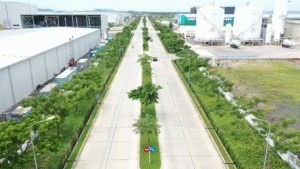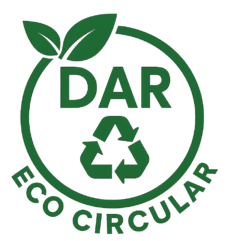🌍 Dar Eco Circular – Pemba Mnazi Eco-Industrial Park
🚀 Vision: Building the Future of Green Industry in Africa
The Pemba Mnazi Eco-Industrial Park (EIP) in Kigamboni, Dar es Salaam, is Tanzania’s bold leap into sustainable, circular industrialization.
As East Africa’s first fully integrated circular economy hub, the park will transform waste into value, power industries with clean energy, and create thousands of jobs—all while safeguarding our climate and communities.
👉 This is not just an industrial park. It is a national flagship of green growth, and a blueprint for how African cities can industrialize without repeating the mistakes of the past.
📍 Site and Location Advantages
Strategically positioned at Pemba Mnazi, Kigamboni, the EIP connects directly to Tanzania’s major logistics and energy networks:
-
25 km from Dar es Salaam Port
-
35 km from Julius Nyerere International Airport
-
Seamless access to Kilwa Road, Bagamoyo Expressway, and the Mtwara–Dar gas corridor
The site’s flat coastal terrain enables large-scale layouts, while greenbelt buffers and safeguards will protect biodiversity and ensure coastal resilience.

🏭 Infrastructure & Masterplan
The park is designed for scalability, synergy, and resilience:
-
Industrial Zones: 30 sheds (20 large, 10 medium), innovation and training hubs, logistics yards, and administrative buildings.
-
Shared Utilities: Waste-to-Energy (WtE), biogas CHP, solar PV, centralized water treatment (zero-liquid discharge), ICT backbone, cooling systems.
-
Transport & Logistics: Dedicated road grid, truck terminals, and intermodal cargo hubs with direct port/rail linkage.
-
Green & Social Infrastructure: Workforce housing, biodiversity corridors, stormwater retention, and public green spaces.
♻️ Circular Clusters
The EIP will feature specialized clusters turning waste into industrial input:
-
Materials Recovery Facility (MRF): Advanced sorting of plastics, metals, paper, and glass.
-
Anaerobic Digestion / Biogas Plant: Produces renewable energy and organic fertilizer.
-
Composting Hub: Supplies agriculture and landscaping with nutrient-rich compost.
-
Plastics & Packaging Zone: Recycling, pelletizing, and SME-led bio-packaging industries.
-
Paper & Cardboard Recycling: Provides sustainable packaging and industrial supplies.
These clusters close waste loops, reduce imports, and open new SME and export opportunities.
🔄 Circular Economy & Industrial Symbiosis
The EIP is not just a collection of factories—it is a living ecosystem where industries collaborate to reduce waste, costs, and emissions:
-
🔁 Waste heat cascading reused across industries.
-
🔁 By-product reuse (ash, slag, effluents) in cement, construction, or energy.
-
🔁 Shared renewable energy loops (WtE, biogas, solar).
-
🔁 Cluster synergies linking recycling, fertilizers, textiles, and food processing.
Guided by UNIDO’s Eco-Industrial Park Framework and Material Flow Analysis (MFA), the park ensures that industrial growth strengthens—not strains—communities and ecosystems.
🤝 Governance & Implementation
The EIP will operate under a Public-Private Partnership (PPP) model, balancing oversight with innovation:
-
EIP Steering Committee: Provides regulation, infrastructure alignment, and ESG compliance.
-
Park Management Entity (PME): Manages tenant services, shared utilities, and symbiosis programs.
-
Policy Framework: Anchored in the Tanzania Investment Act, SEZ incentives, and international sustainability standards.
Phased Roadmap:
-
Phase 1: Core infrastructure, WtE commissioning, early tenant onboarding.
-
Phase 2: Fertilizer, textile, and recycling clusters operational, utilities/logistics fully integrated.
-
Phase 3: Heavy industries, export manufacturing, and advanced industrial symbiosis.
📈 Socioeconomic & Environmental Impact
The EIP is designed to deliver triple-bottom-line transformation:
-
Economic: Tens of thousands of jobs, fertilizer and energy self-reliance, reduced imports, and new export markets.
-
Environmental: Circular use of 1M+ tonnes of waste annually, significant GHG emission cuts, restored coastal ecosystems.
-
Social: Skills transfer, SME empowerment, gender-inclusive employment, and benefit-sharing with local communities.
🌐 Benchmark: Phu My 3 Specialized Industrial Park (Vietnam)
The Phu My 3 Specialized Industrial Park (PM3 SIP) in Vietnam is the key global benchmark for the Dar Eco Circular EIP.
PM3 SIP demonstrates that strategic location, shared utilities, and circular industry clusters can attract billions in FDI, generate jobs, and build a globally competitive green industrial zone.
Dar es Salaam now has the opportunity to adapt this model to Africa, leveraging its port advantage, young workforce, and abundant waste resources.
🎥 Watch Benchmark Video:
🌍 Why It Matters – And Why Act Now
The Dar Eco Circular EIP is more than infrastructure. It is a catalyst for Tanzania’s transition to a low-carbon, resource-efficient economy.
It delivers:
✅ Industrial competitiveness with lower costs and global ESG compliance
✅ Export diversification through recyclables, compost, and bio-products
✅ Climate resilience by diverting waste, producing renewable energy, and cutting emissions
✅ Inclusive growth by creating jobs, SMEs, and community benefits
✨ In short: the Pemba Mnazi Eco-Industrial Park will be East Africa’s flagship circular economy hub — turning Dar es Salaam’s waste challenge into a foundation for green industrial growth.
📢 Call to Action
-
Government & Regulators: Position the park as a national flagship for Vision 2025 and climate commitments.
-
Investors & Financiers: Unlock opportunities in green energy, recycling, logistics, and clean tech, backed by SEZ incentives.
-
Private Sector & SMEs: Secure your place in a future-ready industrial ecosystem with lower costs and higher resilience.
-
Communities & Civil Society: Partner in skills, jobs, and shared prosperity—this park is built for inclusivity.
👉 Join us in shaping Tanzania’s green industrial revolution. Together, we can make Dar es Salaam the continent’s circular economy capital.

